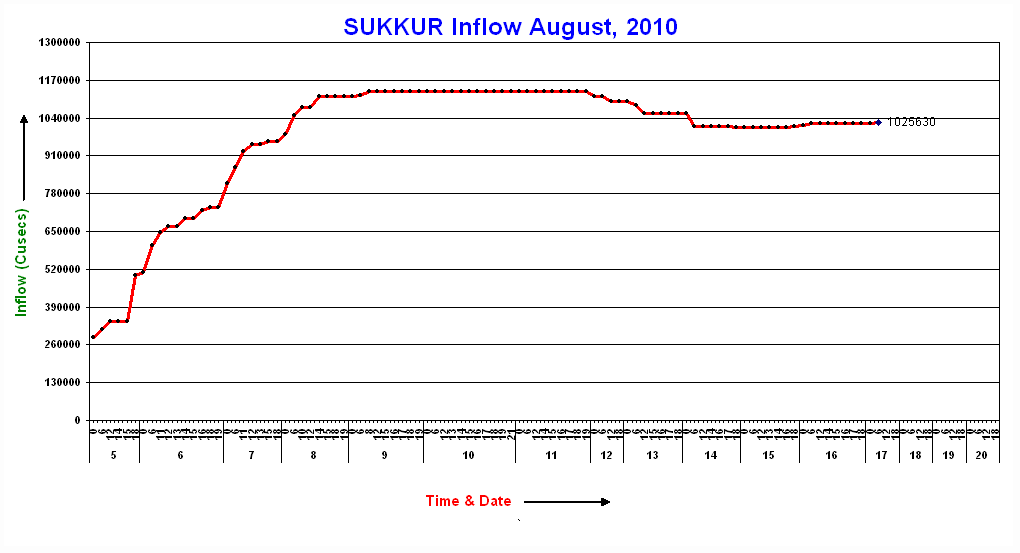17 August 2010
Pakistan flood update: the Kirthar Canal
Posted by Dave Petley
The floods in Pakistan continue to extend to new areas, increasing the magnitude of the impact on a daily basis. The PakMet hydrographs continue to show increasing flow levels. At Guddu the discharge is still rising, and is now close to the peak level reached in the first flood wave (click on “read more” to reveal the rest of this post):
Meanwhile, as expected serious problems are developing in the area of (but so far not on) the Guddu Barrage, where the discharge is also increasing:
It appears that the second flood wave has not really reached Sukkur as yet. However, Dawn this morning reports that: “…residents of Qubo Saeed Khan town and over 100 villages in Qambar-Shahdadkot district were asked to leave their homes on Monday after a powerful current of floodwaters gushing from Garhi Khairo and overtopping the Khirthar canal smashed five gates of the Garang regulator and washed away the entire structure.”
The importance of Sukkur Barrage and the canal network that extends from it is described in this old Pakistan Observer article “Federal Minister for Labour and Manpowewr Syed Khursheed Ahmed Shah has said that Sukkur Barrage is the lifeline for Sindh’s agricultural economy”. Agriculture in this area is heavily dependent upon the water delivered by this canal network; damage to these structures will represent a major problem in the future. Note also that it is likely that the water will have carried subtantial volumes of silt, which may be deposited in the canal network. This may need to be removed once the floods subside. Meanwhile, the water will have destroyed a substantial part of the cotton crop, which should be harvested next month, which in turn will damage the textile industry. Farmers would normally plant winter wheat in the autumn; the viability of this crop must also be in doubt.
Upstream, the impact of the floods and landslides in the mountains is being well-described by the Pamir Times. The Pakistan High Commissioner in London has stated that rehabilitation will require about $15 billion of investment and a “Marshall Plan” style of approach. It is interesting to see the UK Deputy Prime Minister describing the international response to the floods as “lamentable”. To date the UK has committed £31 million to the Pakistan flood disaster, which to be fair is reportedly a quarter of all of the assistance pledged. However, in comparison with the cost of the Afghanistan and Iraq wars (£20 billion over the last ten years for the UK alone), this amount is tiny. Investing in aid to Pakistan, and being seen to be a force for good in a troubled area, would seem to be a good strategy. Building on the Marshall Plan analogy, isn’t it time for a Berlin Airlift style aid effort?




 Dave Petley is the Vice-Chancellor of the University of Hull in the United Kingdom. His blog provides commentary and analysis of landslide events occurring worldwide, including the landslides themselves, latest research, and conferences and meetings.
Dave Petley is the Vice-Chancellor of the University of Hull in the United Kingdom. His blog provides commentary and analysis of landslide events occurring worldwide, including the landslides themselves, latest research, and conferences and meetings.
Nice scientific article.
I am asking this question again.What could be the reasons for water being trapped by Kotri?Has water just topped the banks and is making new ways or something else.Chenab and Indus have carved a new route and joined upstream of Alipur at Jatoi, quite a distance from the original junction.
reason for lamentable response is simple.- Wikileaks.- Recession.- War aid is already giving billionsthat don't reach the right people.- Most of the West is in Vacation.- Western Media is re-run mode, onlyshowing BBC footage of american helicopters.- All the christian charities were driven out of pakistan.- Earthquake response didn't help image of the west.- Pakistan is not even accepting India's donation.- Probably embarrassed to receive money from Afghanistan.- China and Saudi Arabia is missing,how come they are helping pakistan.
Lamentable response also due to ill-defined buildup of floods. Earthquakes and tsunamis have instantly devastating effects. Rain storms have some instant effects (eg infrastructure damage in Swat at peak of rains) but the water keeps going down the rivers and most people don't realise the biggest devastation will happen at a later date.
If Pakistan want more aid, first they should immediately:- Cancel the order for two new $US200 million frigates from China- Pull the army back from the Indian border and stop shooting at Indian troops in KashmirIn the longer term, they need to actually stop supporting attacks on India. Why should we give aid to Pakistan to allow it to keep threatening India? The frigates are for use against India.Secondly it is not safe for westerners, especially Christians, to go and actively provide aid in Pakistan, so it has to be handed over to corrupt organisations. Incidentally, a large part of the cost of the Afghanistan war is because Pakistan chose to support the Taliban, and still does support "good" Taliban who make their attacks inside Afghanistan. The army had a substantial mission in the north this year but refused to attack "good" Taliban and kept most of its forces positioned to fight India.Propping up bad governments because you're afraid you'll get a worse one is the way the U.S. ended up supporting some horrible dictators.
Professor Dave,Many Congrats for building such a wonderful platform. I am writing from Kingdom of Saudi Arabia and many of my friends (specially those whose origin is from Giligt and Hunza )are fan of your blog. @Dear Dravid P you would ask pakistan army to stop shooting at indian army? But why dont you ask coward indian army to stop shooting at innocent kashmiri civilians? Just last month around 20 youth less than 16 years were killed in Kashmir. Are you aware that india is interfering in pak through Afghanistan as well. Please don't give us any relief but please stop interfering in Pakistan's security matters. Majid
@anonymous Dear Friend Indian Army is not doing any such thing in Kashmir, There are 10 kashmiri Peoples working with me, They confirm it. For an instant u Imagine If same kind of violance happen against Pakistani Army, How many people be killed just few thousands. Indian Army has not shoot any of kashmiri youth till date. The death is due to the defensive measure taken by Army & J & K police, Like water canon, Rubber bullets, Tear Gas or Woodstick. So dont blame Indian Army & Do not divert people's mind from Flood. We the Indian's love the humanity, One more thing I want to tell you about the Kashmir, which will prove that India is not interested in acquiring kashmir against the local people. India make a law (Dhara 370), Which state that no any person, who is not resident of J & K, is allowed to buy land or settle permanently in J & K. This is to protect J & K. otherwise if India want he can finish all the issue, like China do in tibbet & now doing in Uigar areas, Settling its main population in J & K, Which will overtake the local population. but India will never do this. We love justice, even a pakistani can win a case in our courts.
@mig,you are wasting your breath.Pakistani minds are so lost.simple logic is turned into conspiracy theory.Whether they sit in pakistanor not.Ya India can enter pakistan from Iran too. Why don't you send suicide bombs to them as well.or how about the sea, you better poison it too.That is right God is punishing you for 26/11. Deal with that.
no brother we never do any such thing, also we do not have enough courage to kill any innocent. The weakness is clearly shown in ur aggresive nature, just be polite & come for a debate. Fighting is never a solution of any problem. We both have a large number of other problems which we have to fight, If together we can win. Good luck
@mig @ and anonymous ( indians) pls goto following BBC link and read that your sooooo inooooocent police and army is firing so calllleddd ruber bullets but it has killed fifty not twenty people in last 2 months in jjust self defence…..http://www.bbc.co.uk/news/world-south-asia-10961577and I quote BBC "Studies have shown there are up to 32,000 widows of the two-decade-long conflict in the Kashmir valley, and nearly 100,000 orphans. Another 10,000 men have allegedly disappeared during the conflict, says a rights group. " I can bet none of the people working with you is a muslim KashmiriShame on you. Injustice is injustice even if it is done in pakistan or in india.
They are reading Namaj everyday, Go to mosque every friday & folowing Roja during Ramjan from 12th of this month, even if they are not muslim. I m Sorry. What do u say about Dhara 370. India will leave the Kashmir If Kashmiri people want but all of this violance is sponsered by external terrorists. They just give contract to local leaders, for collecting Mob & die, that's why many of injured people found died in morning just to fulfill targets.
No. 2 In Kashmir there is a govt. elected by Kashmiris & 67% of kashmiris voted. In that govt. 80%of assembly members ar muslims, CM is Muslim & 90% of police is muslim, even if u say govt is against muslim waht more can we do. Inian Army is not yet employed in Kashmir in this tussle. No. 3 India is only country where Muslims are given special priorty, Congress govt. made new rules to fund Madarsa's, give Loans to Muslims at lower intrest rate, give priorty in education, jobs. Indian govt give a huge rebate for HAJ yatra. There are special Police & administrative Helpline for muslims. Actually Muslims are not Harassed in India. It is Hindu's Who are victim. Even if u or any other say that mulims are harassed in India than they are AHSAN FARAMOSE.
Very dramatic image available from Nasa Earth Observatory:http://earthobservatory.nasa.gov/NaturalHazards/view.php?id=45302
My God, Its really shows that Sukkar Barrage is under immense pressure.Thanks Efrem
Please define the term "cusecs." Here in the US we have cfs (cubic feet per second) and cms (cubic meters pr second), but I've never seen "cusecs" before.